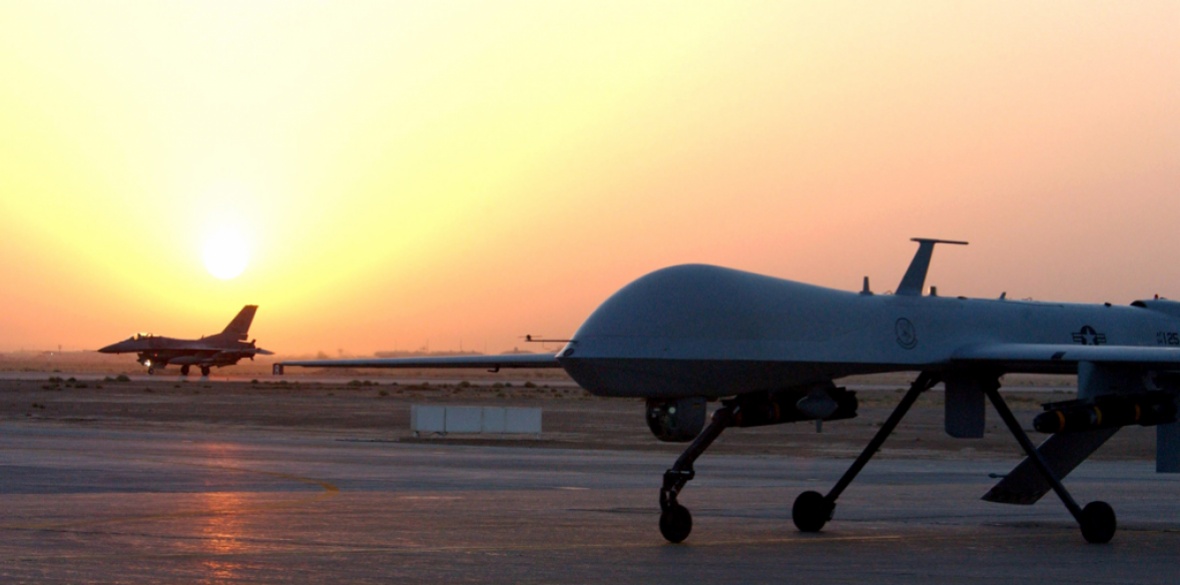This is the last article you can read this month
You can read more article this month
You can read more articles this month
Sorry your limit is up for this month
Reset on:
Please help support the Morning Star by subscribing here
THE all-party parliamentary group (APPG) on drones is undoubtedly right to call for greater clarity on their use, but its recommendations do not go far enough.
Britain may not be as prolific as the United States when it comes to killing supposed opponents with these flying robots, but the signs are that our government’s drone use has increased since former prime minister David Cameron admitted having ordered their use to assassinate two British citizens fighting for Islamic State (Isis) in Syria in 2015.
Given the terror group’s well publicised atrocities against civilians and prisoners of war in its struggle to overthrow the Iraqi and Syrian governments, few will have had much sympathy for that particular strike’s victims.
But it was a targeted killing conducted in a country with which Britain is not at war, and without the consent of that country’s authorities.
Since the explosion in drone strikes under the US Barack Obama presidency — Obama authorised over 10 times more drone killings than his predecessor George W Bush — the dangers of these weapons becoming a routine part of modern warfare have been clear.
Thousands of civilians have been killed in US drone attacks, which are often used to “take out” particular individuals without reference to who they might be with at the time.
Such “collateral damage” is often an unavoidable consequence of ordinary bombing raids as well — and the Morning Star does not use the term “unavoidable” to absolve those who order air strikes of their responsibility for civilian deaths, but to emphasise the reality that for all the hype around “precision” bombs, war always involves the killing of innocent people.
This is one of the reasons our newspaper is proud of its consistent record in campaigning for peace and an end to the reckless use of military options to resolve disputes.
But targeted assassinations raise problems distinct to those posed by bombing.
The targets may not be active combatants — a lawsuit mounted by journalists Ahmad Zaidan and Bilal Abdul Kareem last year maintained that they had been placed on the US presidency’s “kill list” under Obama.
Drone strikes have claimed victims well outside warzones, which suggests politicians who order these deaths have turned their backs on the principle that those accused of a crime should be brought to face trial rather than proclaimed guilty and assassinated without a judicial process.
Drones have an obvious appeal to politicians — people they decide are enemies can be eliminated without the political cost of risking the lives of a country’s soldiers.
This inspired the frequency of their use by the Obama regime, which was keen to extricate the United States from the bloody quagmires created by its invasions of Afghanistan and Iraq.
That creates a risk that governments become trigger-happy about their use, imagining that they are a consequence-free form of military action. But there is no such thing.
The normalisation of drone killings has undermined international law.
The slaughter of civilians is a useful recruiting tool for terrorist groups: the roll-call of countries which have seen the highest number of drone strikes — Afghanistan, Pakistan, Somalia, Yemen — does not suggest they have been effective in resolving conflict, since the security situation in each continues to deteriorate.
Britain may only have admitted to a single civilian death by drone (a Syrian motorcyclist’s demise was noted with “regret” by Defence Secretary Gavin Williamson in May).
But former RAF deputy commander Greg Bagwell has called such a low figure “almost unbelievable” — and the logistical and intelligence support we provide to bloody-handed “partners” such as the US and Saudi Arabia means our government is almost certainly implicated in war crimes they have committed.
Contempt for international law makes the world, including our own streets, less safe. The government should publish its policy and legal advice on drones immediately — but an incoming Labour administration should look to end targeted killings altogether.











